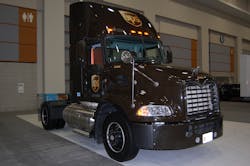United Parcel Service (UPS) is planning to invest some $50 million to build nine liquefied natural gas (LNG) fueling stations-- which will be additions to its current network of four-- with all the stations expected to be fully operational by the end of 2104.
The expansion will include on-site fueling stations in Florida, Illinois, Indiana, Mississippi, Missouri, Ohio, Pennsylvania and Texas, with construction already underway at previously announced LNG facilities in Tennessee and Texas, said David Abney, UPS' COO, in a statement.
“Building these fueling stations is a solid future investment for UPS,” he said. “Since vehicles represent approximately 35% of UPS’s carbon footprint, a cornerstone of the company’s environmental strategy is to support the development and use of lower-emission alternative fuels. By 2017, our goal is to reach one billion miles driven by our alternative fuel and advanced technology fleet. To accomplish this goal the company must continue to innovate and help pave the way toward more sustainable transportation solutions.”
Abney added that, currently, UPS operates 1,000 LNG-fired tractors in Las Vegas, NV, Phoenix, AZ, Beaver and Salt Lake City, UT, plus Ontario, CA; reducing diesel fuel consumption by its ground fleet operations by some 24 million gallons annually.
The company also currently operates approximately 1,000 compressed natural gas (CNG) vehicles and will begin a pilot program testing CNG tractors in early 2014 as it continues to look toward natural gas as a substitute for conventional fuel, he said.
UPS’s move comes at an opportune time, of sorts, as the Energy Information Administration (EIA) estimates that the U.S. will become the world's top producer of both petroleum and natural gas hydrocarbons this year, surpassing both Russia and Saudi Arabia.
Since 2008, the agency noted that U.S. petroleum production has increased 7 quadrillion British Thermal Units of energy or “Btu,” with dramatic growth in Texas and North Dakota. Natural gas production has increased by 3 quadrillion Btu over the same period, EIA added, with much of this growth coming from the eastern U.S.
By contrast, Russia and Saudi Arabia each increased their combined hydrocarbon output by only about 1 quadrillion Btu over the past five years, the agency said.
Still, there remain questions over whether large enough supplies of natural gas will be available on the market at a price cheap enough to for trucking companies to achieve payback for higher upfront equipment and refueling infrastructure costs.
Noel Perry, senior consultant for research firm FTR, noted during the company’s annual Transportation Conference that sustained low prices for natural gas this year reduced drilling rig counts down to 400 versus 1,000 in 2010.
“It suggests that natural gas prices need to move up to improve the drilling economics,” he explained. “That means the price advantage of natural gas relative to diesel to justify natural gas [equipment] investments could get smaller.”
Yet UPS’s Abney thinks that the “lower volatility” of natural gas prices versus diesel prices as the wider availability of LNG as a truck fuel remain compelling advantages.
“The natural gas industry needs companies to commit to using natural gas to help establish a reliable alternative to traditional fuel, and that is just what UPS is doing,” he said. “LNG is becoming more readily available, plus it’s more insulated from market volatilities than diesel fuel.”
Yet UPS is not limiting its alternative fuel options to just natural gas, as the company now operates more than 2,700 alternative fuel vehicles including all-electric, hybrid electric, hydraulic hybrid, CNG, LNG, liquid propane gas (LPG), and biomethane-powered models.
The company stressed that it also takes a “rolling laboratory” approach which means it’s always testing different technologies to find the best sources of energy for its vehicles. For example, UPS noted it recently began a pilot program testing propane vehicles in Gainesville, GA, and over the past year has deployed 20 biomethane vehicles in the United Kingdom.
About the Author
Sean Kilcarr
Editor in Chief
Sean Kilcarr is a former longtime FleetOwner senior editor who wrote for the publication from 2000 to 2018. He served as editor-in-chief from 2017 to 2018.
